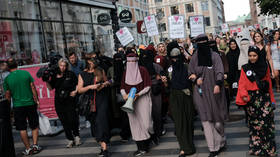Evicting migrants from Danish inner-city ghettos is NOT racism, it’s common sense - and immigrants will benefit the most

Evicting migrant tenants from culturally isolated inner-city ghettos and insisting they learn a new language might not appeal to liberal commenters, but Denmark insists its “social experiment” is what the nation needs.
The Scandinavian country is pressing ahead with tough plans to clear and rebuild its troubled and increasingly Islamicized inner-city ghettos, in a move that, predictably, is being condemned by the United Nations and other liberal organizations.
But this is not some cruel social engineering - or the “social experiment” as the Danish media have dubbed it - designed to force generations of immigrants onto the back foot: it is good common sense that can only benefit everyone concerned.
And it’s not just Danish society as a whole that stands to gain but, crucially, the immigrants themselves. Not that the United Nations sees it that way.
Also on rt.com Crime pays off? Danish city offers convicted criminals CASH AID for moving out of ‘ghettos’For the last 10 years, the Danish government has published an annual ghetto list, highlighting those neighborhoods blighted by higher-than-average jobless and crime rates and lower-than-average educational attainment. So far, so no problem for the liberals who would agree that identifying these communities is the starting point to helping them.
But that’s not all a deprived neighborhood needs to find a place on the ghetto list. It also needs half of its population to be comprised of first- or second-generation immigrants. And making that a ghetto criteria sends the liberals into a spin.
The former United Nations Commissioner for Human Rights, Jordan’s Prince Zeid Ra’ad Zeid Al Hussein was not happy with the ghetto list in 2018 and warned on Twitter that it was “hugely troubling & risks heightening racial discrimination against people of migrant origin - further ‘ghettoising’ them. Coercive assimilation measures run risk (sic) of fuelling racial prejudice, xenophobia & intolerance.”
#Denmark’s new “ghetto package” is hugely troubling & risks heightening racial discrimination against people of migrant origin - further “ghettoising” them. Coercive assimilation measures run risk of fuelling racial prejudice, xenophobia & intolerance – Zeid. #FightRacismpic.twitter.com/mZhQiGkMIW
— UN Human Rights (@UNHumanRights) July 3, 2018
As far as the Danish government was concerned, the alternative, of doing nothing, was not an option and they ignored the UN and have introduced a set of stringent policies aimed at improving the areas and moving them off the ghetto list.
The measures include: allowing for collective punishment –by eviction– of entire families if one of their members commit a crime; forcing migrants to take language tests, which, if failed, can trigger be withdrawal of benefits; and cutting the amount of public housing to just 40 percent by emptying entire blocks and converting them to private housing. Under a law that came into force in January, tenants will be offered alternative accommodation –but with little control over the location, quality and cost– and those who refuse may be evicted. The Guardian ran a critical piece this week under the headline: ‘How Denmark’s ‘ghetto list’ is ripping apart migrant communities – Copenhagen and other cities are planning mass housing evictions in a ‘social experiment’ to encourage integration’
But migrants are not simply being booted out of their homes with nowhere to go. They will have the option of alternative, sometimes renovated, housing as the government seeks to shake the communities out of their sense of what the article describes as “unproductive self-isolation.” They are to be re-housed but it has been recognized that just moving home is not the answer to a multi-faceted problem.
Also on rt.com 'Don't like to see little girls in veils? Move out of Sweden': Muslim teacher & Muslim politician clash on live TVAs multiculturalism has found in the UK, when people seek to isolate themselves into communities where cultural norms are not adapted to those of the host country then problems such as benefit-dependency, joblessness, poverty and criminal behavior can arise.
Alongside the very fundamental economic struggles of living in a westernised foreign country, a sense of belonging does not come automatically but takes considerable nurturing and encouragement.
And if first generation migrants do nothing about those problems then they are simply passed on, so that you end up with a second generation issue that can prove far more resistant to change and requires pretty bold action to address.
The longer a sense of isolation is allowed to progress the more the feeling of ‘Us and Them’ grows within a migrant community and the reverse concept of ‘Them and Us’ takes root among the citizens of the host country.
This is extremely unhealthy. But to suggest, as the UN did, that encouraging migrants to adopt the norms of their host country amounts to “coercive assimilation,” is nonsense. How could it possibly be wrong or “coercive” that the Danes want pre-school children from the identifiable problem communities to spend at least 25 hours each week in state kindergartens that have a migrant intake of no more than 30 percent?
This is not racism. It is common sense. The suggestion that it is Muslim communities that are being targeted is correct. Because they are the communities, and not those of poor, white Danes, that need help with language.
It’s admittedly tough, but it is also totally fair, as learning the host language is the starting point of assimilation for any migrant. If you cannot speak your country’s language, you will struggle in education, socialization, in employment and as a citizen.
Also on rt.com UK court rules Islamic faith marriages invalid under English law, prompting fears Muslim women’s rights now at riskYou will live on the fringes of society, unable to contribute in any meaningful way and forced onto the path leading to welfare dependency, crime and social isolation.
The difficulty that some people have with the ghetto list is that many of those affected are from the Muslim communities. Year upon year of open-door immigration and conflict in parts of the Middle East and north Africa, predetermined that problems would arise further down the road.
And here we meet those problems at social cul-de-sacs in the big cities of Europe. Migrants have been welcomed in by well-intentioned governments with no real idea of how to deal with their integration, just crossing their fingers that somehow they would see the superiority of the host culture and turf their own years of history, of ways of doing things, to take on board a whole new set of behaviors and beliefs.
That just doesn’t happen outside the land of unicorns and rainbows. People are different, stubborn and naturally resistant to change. You are bound to have problems. Lots of them.
So while the UN and liberal commenters decry Denmark’s “social experiment” and this policy medicine may be hard to swallow for some, if the ghetto list and its associated actions prove to be a panacea to the many ills of failed multiculturalism, then it should be administered across Europe. Pronto.
Think your friends would be interested? Share this story!
The statements, views and opinions expressed in this column are solely those of the author and do not necessarily represent those of RT.















